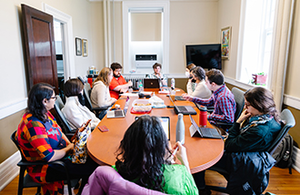The Program in Comparative & World Literature (CWL) is now the Department of Comparative & World Literature.
Faculty voted unanimously to reorganize into a department in 2007 and again in 2021. The proposal received approval from the Illinois Board of Higher Education in August, following its approval by the UIUC Senate Educational Policy Committee last year.
Interim department head Harriet Murav said the reorganization reflects the work that has already been happening for years.
“The department is the primary unit on campus,” said Murav. “Why be a program when we’ve always acted as a department? This is just a way of bringing what already exists on the ground to greater visibility for both students and faculty.”
The reorganization proposal stated that in all respects, CWL has already been functioning like a regular department, with tenure-track and tenured faculty, degree programs at both the undergraduate and graduate levels, and an administrative structure similar to those of comparable departments.
Murav said another key point was that other programs in comparative literature at peer institutions are organized as departments, not programs.
“It’s advantageous in recruitment, prestige of our department and faculty, and just to be on the same level as others,” she said.
The Comparative & World Literature program was founded in 1967 and has been at the forefront of interdisciplinary teaching and research in humanities ever since. Its focus is on the study of national literatures and cultures in the original language, meaning students must develop a strong competence in multiple languages and cultures.
“Before everyone else went global, we were already there,” said Murav. “We teach courses on literatures of Africa, Asia, and many other regions and territories that most traditional programs only started offering very recently.”
CWL was one of the first to offer and emphasize non-Western and cross-cultural perspectives, and world literature—from Asia and Africa to Europe and the Americas—is an area where CWL continues to excel today.
“This is a course of study that takes you to other languages, cultures, regions, and times, other concepts outside the world of Anglo-American literature, culture, and history,” said Murav. “This is a department where the study of literature in its original language matters, and by putting together more than one literary tradition and looking at concepts, institutions, and forms of expression in multiple languages from multiple regions, we get a perspective that you don’t get anywhere else.”
Dania De La Hoya Rojas
